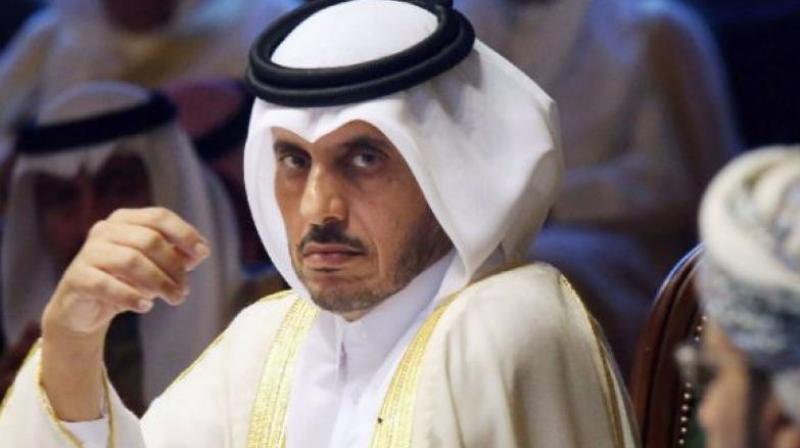New Mideast battlelines as Qatar row gets uglier

Curiouser and curiouser!” wondered Alice in Lewis Carroll’s book Alice’s Adventures in Wonderland. She might as well have been referring to the three Gulf Cooperation Council (GCC) members ganging up on Qatar, in league with Egypt, Yemen and some others. They cut off all links, including communication ones. The United Arab Emirates even criminalised any expression of sympathy for the beleaguered Qataris. Their worry was that Dubai, the second most powerful of the seven emirates constituting the UAE, needed both Iran and Qatar as it is the entrepot for regional trade and connectivity. At play has been simmering discontent among the rulers of Saudi Arabia and the UAE since US President Barack Obama endorsed the nuclear agreement between Iran and the Permanent 5+1. This had upended the traditional US approach to Gulf security since the 1979 Iranian Islamic revolution, after the overthrow of the Shah of Iran, a US ally, which rested on containing Iran by underwriting the security of GCC members and strengthening their military capacity.
Mr Obama reasoned that the US fatigued by fighting nonstop since 2001 asymmetrical wars and that GCC members writing cheques to surrogates and not fielding troops could not counter the ISIS. Only Iran could provide full spectrum wherewithal for countering and eliminating it, as the Shias now controlled Iraq, led the Syrian government and were a powerful force in Lebanon. Once Russia jumped in with direct air support for the Bashar al-Assad regime in Damascus, the counter-ISIS alliance was in position, consisting of Iranian Revolutionary Guards officers, Hezbollah fighters and Russian equipment and air support. The Saudis loudly and Emiratis under their breath both expressed extreme displeasure over this policy shift. With Donald Trump becoming US President, hope rose as he began his foreign tours with the Riyadh summit, where the Saudis gathered Sunni potentates from across the region, including Prime Minister Nawaz Sharif of Pakistan. The time was ripe as a naive and transactional US President, paying little attention to policy details, could be led back to the past.
Mr Trump’s assumption to rest policy on weaning away Russian President Vladimir Putin from Iran faded as his administration ran into charges of collusion with Russia during his election campaign. Additionally, the question of who would provide the foot soldiers was left nebulous as at best Russia could rein in its air support and Nato had no stomach for another out-of-area campaign. Whether Mr Trump would recommit US forces remained moot as it went against his isolationist rhetoric as well as his instincts. Surrounded by miasma of fact and fiction, Mr Trump stepped into the Saudi parlour. His son-in-law Jared Kushner camped in the kingdom, preparing the ground for major arms sales. The Saudis are adept at the old game of arms-purchase-for-influence. Within a fortnight of the Riyadh summit, the Saudi-Emirati core of the GCC unleashed their anti-Qatar crusade on June 5. On June 6, President Trump endorsed it through a tweet, saying the “funding of radical ideology” had to be punished, and Qatar qualified on that count.
A day later Teheran was rattled by coordinated attacks on its Parliament and founder Imam Khomeini’s tomb. The hybrid attack by suicide bombers and gunmen caused limited damage but demonstrated ISIS’ widening reach. Earlier reports have claimed ISIS resurgence in Afghanistan. Recent attacks and new information that it has occupied the Tora Bora caves heightens concerns over their shifting to Al Qaeda’s old haunt as their base shrinks in the northern Iraq-Syria salient. President Trump’s flip-flops are now assumed as integral to his policymaking. A MSNBC report, quoting sources close to Mr Trump, claimed when he was tweet-concurring with the Saudis against Qatar he was actually unaware about the US’ largest regional airbase at al-Udeid in Qatar, which hosts 11,000 troops and 100 US aircraft. This is indirectly confirmed by Mr Trump later tempering his rhetoric. In fact, last week, two US vessels were in Qatar for joint exercises with the Qatar Navy. Qatar also signed a deal to buy F-15 jets for $12 billion. Such opportunistic deal-making forced the Economist to lament: “If only the world had a superpower focused more on diplomacy and less on selling weapons.”
The fracas splits the GCC, with Kuwait and Oman refusing to rally behind the Saudi-Emirati onslaught. Regionally too cracks emerged as Iran, more openly, by sending planeloads of foodstuff to a blockaded Qatar, and Turkey, subtly, by promising troops oppose Qatar baiters. The US Senate, meanwhile, voted 98-2 new sanctions against Russia and Iran. The Trumpian strategic construct that his equation with President Valdimir Putin will be the basis for eliminating ISIS, resolving the Syrian imbroglio and resolving the Israel-Palestine dispute now lies shattered. An inexperienced prince in Saudi Arabia, empowered by doting father King Salman, impetuously shapes policy. In the UAE, relatively more experienced and yet untested Crown Prince Sheikh Moha-mmed bin Zayed has made common cause with his Saudi namesake. Unprecedented for the UAE, it committed 5,000 soldiers to fight in Yemen against the perceived twin challenges of Iran-aligned Houthis and Al Qaeda of Arabian Peninsula. But chaos caused by the fighting also creates a vacuum, and there is evidence of a Muslim Brotherhood affiliate Islah raising its head. History is forgotten as Yemen saw in the 1960s Egypt’s Gamal Abdel Nasser, supported by the Soviet Union, pit military might to support a republican challenge to Saudi-sponsored rulers. It ended after much loss of life and Egypt, distracted by President Nasser’s “long-breath strategy” in Yemen, was routed by Israel in the 1967 war. Nasser then fought for supremacy in the Red Sea region. The battlelines now range around the Gulf and the Saudis’ antagonist is local and grittier Iran. Mr Trump, by taking sides, has circumscribed US options. The outcome, still uncertain, can have serious consequences for the Indian diaspora and the economy.

